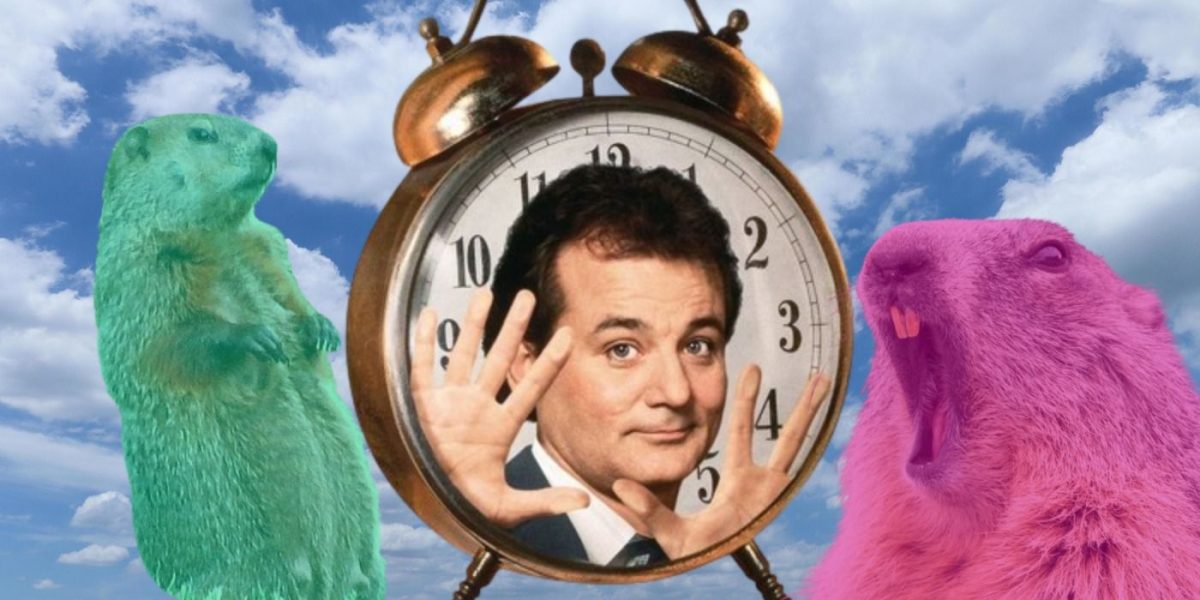
Why Groundhog Day Is a Philosophical Masterpiece, Explained
Feb 3, 2024
“What would you do if you were stuck in one place, and everything that you did was the same, and nothing mattered?”
In one of his finest roles, Bill Murray plays sarcastic and arrogant Pittsburgh weather forecaster Phil Connors in Harold Ramis’ 1993 masterpiece, Groundhog Day. Phil believes that he’s destined for far greater things in life than local television, so he resents the seemingly menial task of reporting on the annual Groundhog Day celebration in small-town Punxsutawney, Pennsylvania. With a blizzard standing in his way of returning home, the meteorological diva finds himself stuck in the quaint “tiny village in Western Pennsylvania” for the night.
As he awakens the next day, he finds it is not the next day at all, and that he is actually re-living February 2nd, or Groundhog Day, all over again. The journey that the audience takes with this character’s extraordinary self-development feels entirely organic (largely thanks to Bill Murray), as the only way for him to break the cycle seems to be through personal redemption — or personal annihilation. While the movie exists within the romantic comedy genre, it actually holds some deep spiritual and philosophical meanings that make it an absolute classic and, quite frankly, one of the best films ever made. Here are just some of the most prominent spiritual and philosophical themes of Groundhog Day.
Groundhog Day and the Meaning of Life
Groundhog Day 5 /5 Release Date February 11, 1993 Runtime 101 ProsBill Murray shines in one of his best roles, with a great supporting cast. The storyline is timeless and endlessly entertaining. The existential themes of Groundhog Day are deeply meaningful. The quotable dialogue, snarky humor, and genuine emotion mix perfectly.
Phil goes through many mental stages in Groundhog Day, and they in many ways reflect the phases of an existential or spiritual crisis, when one comes face to face with meaninglessness. Phil’s reactions traverse a well-trodden philosophical path:
Crisis and confusion with the realization that everything is meaninglessness (i.e. the first days of Phil’s time loop). If everything is meaningless, then consequences don’t matter, resulting in abject hedonism (i.e. Phil engaging in gluttony, robbing a bank, tricking women into sex, and so on). Selfish hedonism ultimately doesn’t fill the empty void of meaninglessness, and a dark nihilism emerges (i.e. Phil attempts suicide countless times). Nihilism can be sublimated by the recognition of others and the community of suffering we’ve all been birthed into (i.e. Phil recognizes the old man and repeatedly tries and fails to save his life). As the ego diminishes and one realizes that meaninglessness is inherently meaningless, one begins to live more for other people, to rid oneself of selfhood, which was the cause of suffering in the first place (i.e. Phil begins to help everyone in town). This path of philosophical or metaphysical awakening to the ‘meaning’ (or lack thereof) of life is laid out in many ancient texts, especially Near Eastern ones. The plot of Groundhog Day is very much like Jewish wisdom literature, especially the Book of Ecclesiastes, alongside Egyptian texts like “The Good Fortune of the Dead” and “A Dispute Over Suicide,” and, of course, the Buddhacarita. Groundhog Day just puts a postmodern spin on the very old human quest for meaning and purpose in life.
Phil Connors’ Cycle of Reincarnation
Speaking of the Buddhacarita. Phil Connors becomes a kind of Siddhartha character as he travels to Punxsutawney and is subsequently entrapped in a time loop. The movie’s idea of the cycle of growth that the TV personality goes through is regarded by some religious scholars as a corollary to Buddhism, as the film depicts the endless loop of death alongside consequent rebirth.
The cycle Phil is in is known as “Samsara” by Buddhists; we may also know it as karma. Under the law of karma, each of Phil’s actions has consequences: he makes a decision, and that choice slightly changes his reality. He’s stuck in a time loop and every day is the same, but when his actions change, they affect his surrounding reality. This concept is understood as ’cause’ and ‘effect,’ and Buddhists believe that good choices (cause) result in positive rebirths (effect), while bad choices result in undesirable rebirths.
Related: Zen and the Art of Filmmaking
Although having multiple chances at life sounds like a blessing, the idea of Samsara is actually a punishment of sorts (as seen by Phil’s eventual depression and endless attempts at suicide), and an opportunity to reflect upon one’s choices. As one rids oneself of ignorance and ego (through choice and awareness), a person can awaken to the true interconnected reality and ontological void at the heart of everything (or “Śūnyatā”), freeing them from the cycle of Samsara and into a heavenly nirvana (or at least escape the endless suffering of the reincarnation cycle and return to nothingness).
After making all the poor choices, Phil purifies his karma and decides to live a life of service, confronting his darkest shadows and going out of his way to help others, thus breaking the Groundhog Day (or Samsara) cycle. The vicious cycle disintegrates only when he stops trying to change things in order to satiate his own desires and ambitions or escape his fate, and instead embraces the opportunity of each moment to reduce the surrounding suffering.
Abandon All Attachments in Order to Transcend
Groundhog Day wonderfully exemplifies the power of approaching each moment as though it were a completely new experience. This is perfectly conveyed in Buddhist practice. When the bell rings in a Training Temple, one may be wearing the same clothes and following the same routine as always, but the bell reminds a person to treat each moment as unique without being distracted by the desire for different circumstances or always having to know what will happen. Phil essentially learns to be mindful of the present moment (he’s stuck in it, after all), and to no longer be so attached to it.
Just one of many illustrations of this in the film is how Phil finally ‘gets the girl’ (delightfully played by Andie MacDowell). Initially driven by lust for Rita and clinging to his desires and expectations, Phil uses the time loop to learn everything about her and uses that knowledge to get into her pants. And yet it never seems to work. They only seem to really forge a connection when he is honest with her, and he eventually gives up on trying to possess her altogether, allowing true connections to be made without force. She comes to him, and real intimacy is formed as a result. But even if she didn’t, that would be okay; he was no longer so desperately attached to the notion that he needed to be with her.
In many ways, then, Groundhog Day is a journey from mindlessness to mindfulness, from selfishness to selflessness. Mindfulness allows us to be more aware of how we go about our daily lives, of our own actions and decisions. We can become more aware of the choices and suffering of others around us, effectively allowing us to break free from the rut we’ve fallen into. Through it, we can switch off our default settings and become something more than automatons.
Related: 25 Deeply Philosophical Movies to Ponder Over
This is one great meaning of Groundhog Day — Phil had no time for anyone at first and saw everyone as mere objects, believing that the world revolved around him. He finally escapes his endless day by becoming more mindful and overcoming his negative perceptions of others and the world, where he confronts his suffering and discovers opportunities for growth while learning to be more compassionate. He removes himself from the center of everything.
Shadow of the Groundhog: Depression and Hope
Columbia Pictures
As previously mentioned, part of what makes Groundhog Day so timeless is that it explores true existential anxiety in a meaningful, entertaining, and productive way. People who have actually experienced these kinds of spiritual and philosophical crises, however, may find the film to be too simple in its resolution, too positive and sweet. Recent variations on Groundhog Day have often been more pessimistic or morbid about the nature of reality, such as Russian Doll, Palm Springs, and Happy Death Day. The band Nine Inch Nails essentially took the premise of the film and turned it into a song that reads like a suicide note. Check out the lyrics below:
“Every Day Is Exactly the Same”
I believe I can see the future, because I repeat the same routine
I think I used to have a purpose, then again, that might have been a dream
[…]
Every day is exactly the same, there is no love here and there is no pain
I can feel their eyes are watching, in case I lose myself again
Sometimes, I think I’m happy here, sometimes, yet I still pretend
I can’t remember how this got started, but I can tell you exactly how it will end
I’m writing on a little piece of paper, I’m hoping someday you might find
Well, I’ll hide it behind something, they won’t look behind
I’m still inside here, a little bit comes bleeding through
I wish this could’ve been any other way
But I just don’t know, I don’t know what else I can do
Every day is exactly the same
[Repeat]
You don’t have to be stuck in a time loop in order to relate to Phil’s repetitive existence. After all, when he’s drinking with townsfolk and muses, “What would you do if you were stuck in one place, and everything that you did was the same, and nothing mattered,” a regular man replies, “That about sums it up for me.” In late capitalism, when everyone is working more for less and everyone is grumpy and nobody has much hope for the future, it very much seems like nothing any of us does will matter. Wars will take off. Poverty and inequality will increase. Climate change will ruin us. The sun will burn out.
Everyone is guilty of being absorbed in their daily routines, addictions, bad habits, and so on, and life can easily pass us by and lose its beauty. Groundhog Day was especially relevant during the COVID-19 pandemic, when society found itself in the biggest rut of all. With everyone isolated to varying degrees, we found ourselves losing hope, and our view of ourselves and life became extremely negative. Many got stuck in the same kind of loop as Phil Connors, with all the days blurring together into the same inconsequential doldrums.
Columbia Pictures
But some people made choices to reduce the suffering of others. Some acted selflessly to prevent the further spread of the disease; some toiled away as essential workers for the benefit of others; some developed tests and vaccines. These people de-centered themselves from the global crisis, refusing to make the pandemic all about them (“why should I have to wear a mask,” “you want me to get vaccinated?” “what about my kids?”). Instead, they navigated it with selfless compassion, like karmic heroes, like Phil Connors at the end of the movie.
We have the power to turn our own meaningless, repetitive existence into a gift, and Phil’s mindful turnaround has taught us that no matter what situation we are placed in, no one wants to stay stuck. Yes, the groundhog is coming to tell us about the next six weeks, but today is today and now is now. Every February 2nd, fans watch Groundhog Day and take a lesson or two from this very special film, one which reminds us to live for today, and not for the next six weeks, winter or otherwise. If you haven’t seen Groundhog Day yet, you “better get going if you’re gonna stay ahead of the weather.”
Watch Groundhog Day
Publisher: Source link
Aubrey Plaza Issues Statement After Jeff Baena’s Death
The 40-year-old star and Jeff’s family issued a statement to People on Monday, where they called their loss an “unimaginable tragedy.”The Los Angeles County coroner’s office previously determined that Jeff died by suicide in his LA home. He was 47…
Jan 10, 2025
Jill Duggar’s Husband Clarifies Where He Stands With Jim Bob Duggar
Jessa Duggar (m. Ben Seewald)Jim Bob and Michelle's fifth child, Jessa Duggar, was born Nov. 4, 1992. Jessa met Ben through church and he began courting her in 2013—the old-fashioned approach to romance coming as a brand-new notion to a lot…
Jan 10, 2025
The Internet Has Officially Lost It Over Andrew Garfield's Slutty Glasses
That man knew exactly what he was doing with those glasses.View Entire Post › Disclaimer: This story is auto-aggregated by a computer program and has not been created or edited by filmibee.Publisher: Source link
Jan 9, 2025
Armie Hammer Lands First Movie Role Since Cannibalism Allegations
Armie Hammer Cameos As “Kannibal Ken” in Music Video 4 Years After Cannibalism ClaimsArmie Hammer is heading back to the big screen. More than one year after the Los Angeles Police Department ended their lengthy investigation into the Call Me…
Jan 9, 2025











